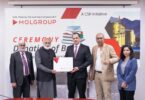Kerem Alkin
For the last two years, in particular, the concept of the “great reset’ has been on the international agenda.
On one hand, the concept is described as an acceptance or a perception of the end of the world. On the other, some define it as “restructuring of capitalism” or the reviewing and restructuring of the world, including from areas spanning daily life to global business.
According to those who see the great reset as a road to the end of the world, global investors, mega-companies or international opinion leaders are responsible for the frightening process that aims to make us “digital slaves.”
The coronavirus pandemic also backs their argument, theories and scenarios as, they claim, the deadly disease was produced in a laboratory to make mankind slaves of the international companies and business networks.
Additionally, millions of people believe that the “new designed lifestyle” is being imposed on them, while most opinion leaders think this is just a conspiracy theory.
In the midst of all these chaotic debates, there are also those who interpret the great reset as the total collapse of the world’s energy or financial system, where the world would face a pre-civilization situation.
Some global opinion leaders think that the concept will support the global climate, ecological balance and sustainable development conditions, which will eradicate income inequality, and racial and gender discrimination. They say, therefore, the world must focus on the fundamental issues when discussing such concepts.
However, the same leaders say the world is now facing a “sincerity test” by struggling against the pandemic.
In terms of vaccinations, there is a huge double standard worldwide. The unjust distribution of vaccines in Africa, for example, has led to a lack of vaccinations.
Neither the U.S. nor the European Union, Russia or China has been able to take a constructive stance or action on “humanitarian diplomacy” for the last year.
For this reason, it can be said that leading countries do not have solution-oriented efforts. Here, the great reset finds supportive arguments.
Therefore, it is now time to focus on rerouting for a more livable world and to move away from selfishness that segregates, destroys resources and devalues sustainable peace and human rights.
Cooperation in competition
The U.K.’s Brexit decision is a costly step for both the U.K. and the EU in the short and medium terms. It is just one of the difficult headlines of this century.
Our times mark a period in which global economic and political power centers are being reshaped and economic-political relations between regions and countries are knitted with a more complex and multilayered network of diplomacy. Today, no country is a power center, and rude attitudes or use of force and threats do not help anyone in solving problems.
Meanwhile, with entrepreneurial and humanitarian diplomacy, Turkey focuses on the fields of technology and digitization, the market economy, and trade and investment. The country does it despite the challenging conditions of global competition. It offers priceless regional and global cooperation opportunities.
Turkey positions itself as a constructive and inclusive future gateway with its ability to find solutions to political and humanitarian issues. It protects its role as a safe harbor supplier country.
All countries need different and multi-perspective analyses.
The supersonic digitization and shift in production require countries to restructure the employment market and the relations between goods and financial markets.
Building a more fair and more inclusive system for the world requires creating “opportunities for cooperation.”
In this context, Turkey is one of the top countries that can provide the most effective, solution-oriented and fair ideas on a global scale.
All actors of the world’s economic-political system should focus on the construction of an ecosystem that would use Turkey’s dynamism, production and entrepreneurial capabilities, motivational skills and sociocultural virtues based on humanitarian values.
Turkey’s national technology agenda and its national space program are here to provide opportunities. Since we live in a time when global obstacles continue to increase, such opportunities shouldn’t be missed in order to strengthen inclusive global development, which is a key to long-lasting peace and success.
Otherwise, the “architects” of the new future that will make the world uninhabitable will regret it.






